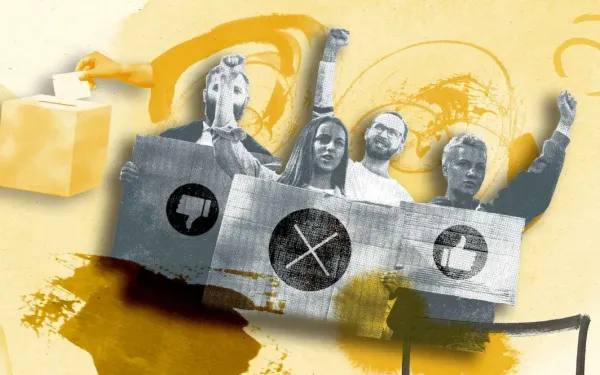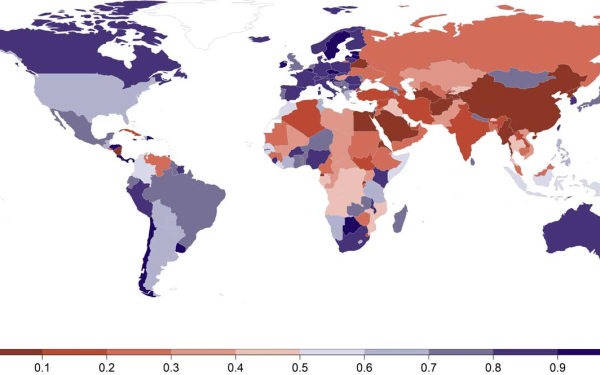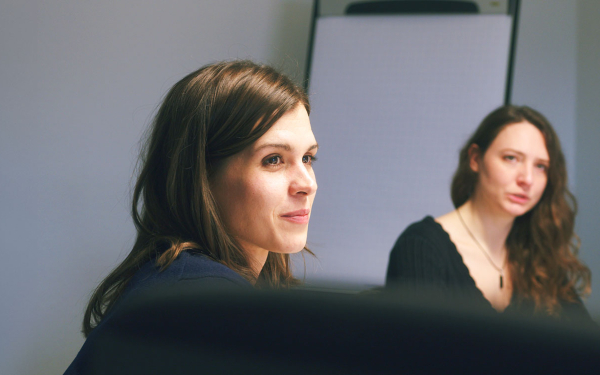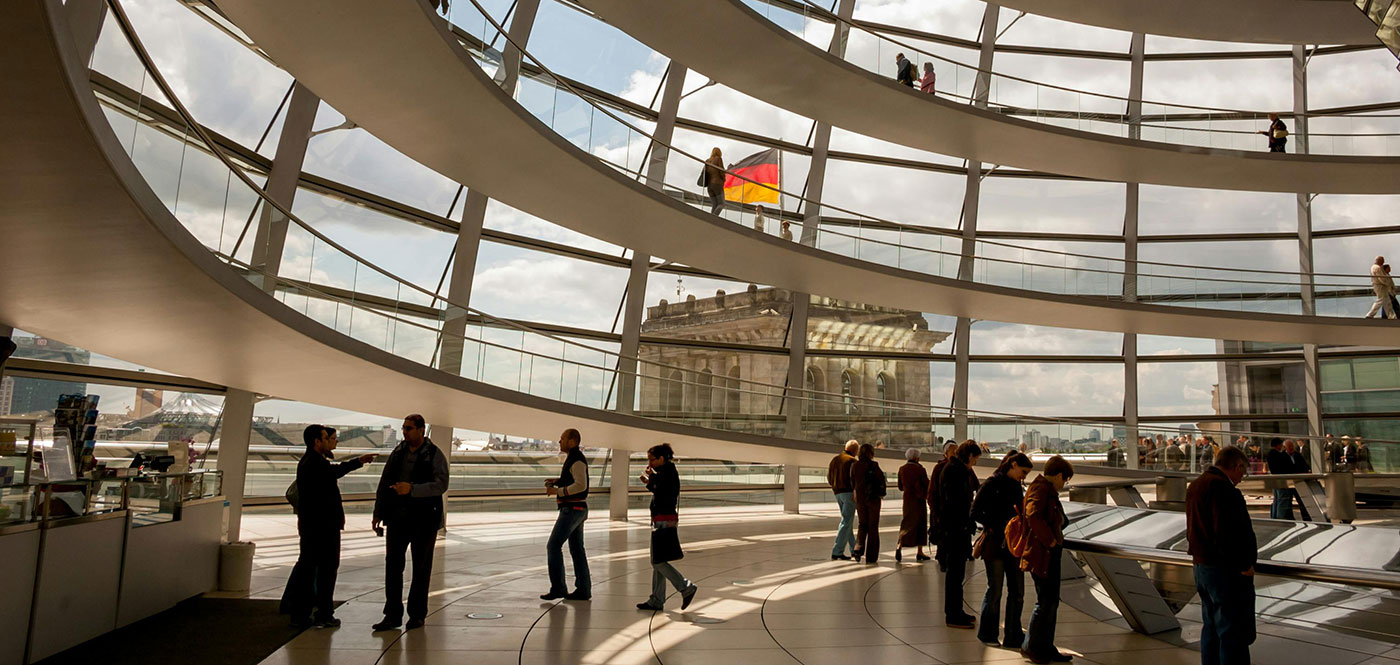
Donatello Trisolino - pexels
'We cannot predict whether democracy will last'
#DemocracyGermany is at the centre of a maelstrom of global crises and conflicts. Right-wing populists are enjoying growing popularity. And many solutions are expected from the new federal government. And quickly! A conversation between sociologist Steffen Mau and Georg Schütte, CEO of the Volkswagen Foundation, about the end of the 'fair-weather democracy' (Mau) and the journey into the unknown.
Professor Mau, are the established parties still at all capable of fulfilling the public's expectations?
Prof. Dr Steffen Mau: The public is more easily swayed by emotional reactions and crowd opinion than in the past, and parties are responding to this with affective politics. Ties to parties and orientation towards their programmes are dwindling in favour of a democracy of moods and expectations. Politicians are expected to deliver certain services and do certain things. If they fail to deliver, people turn to other political camps. This can be seen most clearly in the voting behaviour of the under-25s: in 2021, the majority of them voted for the Greens and FDP, but this time for the Left and the AfD. This cannot be explained by a profound change in fundamental political orientations.
Dr Georg Schütte: All of this must be seen against the backdrop of lost international certainties. The Russian war of aggression in Ukraine, Trump's re-election, the rise of right-wing and right-wing populist parties and positions from Hungary to Italy and France to the USA: this is also changing political trends in Germany.
Mau: Behind this is a general destabilisation of the old political order, with changed rules and growing opportunities for new players to gain political ground. At the moment, we cannot really predict what the pressure on democratic institutions will lead to and whether they will hold up. It has to be said that Germany has been a fair-weather democracy for most of its history, with the coexistence of positive economic and democratic development. If the scope for economic distribution continues to shrink and economic uncertainty spreads, it remains to be seen whether people will remain loyal to democratic principles or flock to the populists in even greater numbers.
Schütte: The question of the future of democracy as a form of organisation for our state and our society is one that concerns us as a foundation. That is why two years ago we launched a funding programme for democracy research with the title Transformational Knowledge on Democracies under Change – Transdisciplinary Perspectives, with two funding lines: task forces and cooperation projects. This is a challenge. As a science funding organisation, we work with a focus on knowledge creation; translating knowledge into political action is not really part of our remit.

Prof Dr Steffen Mau is a sociologist and holds the Chair of Macrosociology at the Institute of Social Sciences at Humboldt-Universität zu Berlin.
That is why we are trying to take an intermediate route and fill a gap that we have identified. By facilitating transdisciplinary research, i.e. research projects that bring together scientists from different disciplines with stakeholders from different areas of civil society, in the expectation that scientific knowledge can in this way achieve social impact.
...Germany has been a fair-weather democracy for most of its history
Can you give a concrete example of this?
In the run-up to the state elections in eastern Germany, we were also very concerned about what is happening and asked ourselves what can we do? In a keynote speech at the time, Mr Mau drew our attention to the importance of citizens' councils, the establishment of which might help to regain political trust. As a science sponsor, we cannot fund such councils directly – but we can support accompanying research into their effectiveness. For example, in the Shaping Democracy project, which is investigating how citizens' councils can be integrated into the political system.
Are you not afraid of being accused of political activism?
Schütte: We had lively debates about this at the Foundation: if we make partners of affected social stakeholders in the research process, isn't the outcome more or less predictable; namely their respective political or socio-political agenda? And does research then merely serve as pure confirmation of the status quo? We have decided to take the risk and expect such projects to address, reflect on, and subsequently determine the interests and roles of civil society stakeholders in the research process so that new knowledge can be gained and transfer relevance can be achieved.
Mr Mau, why have so many people in eastern Germany in particular turned their backs on the traditional parties that in many regions there is now only one mainstream party left, and it is called AfD?
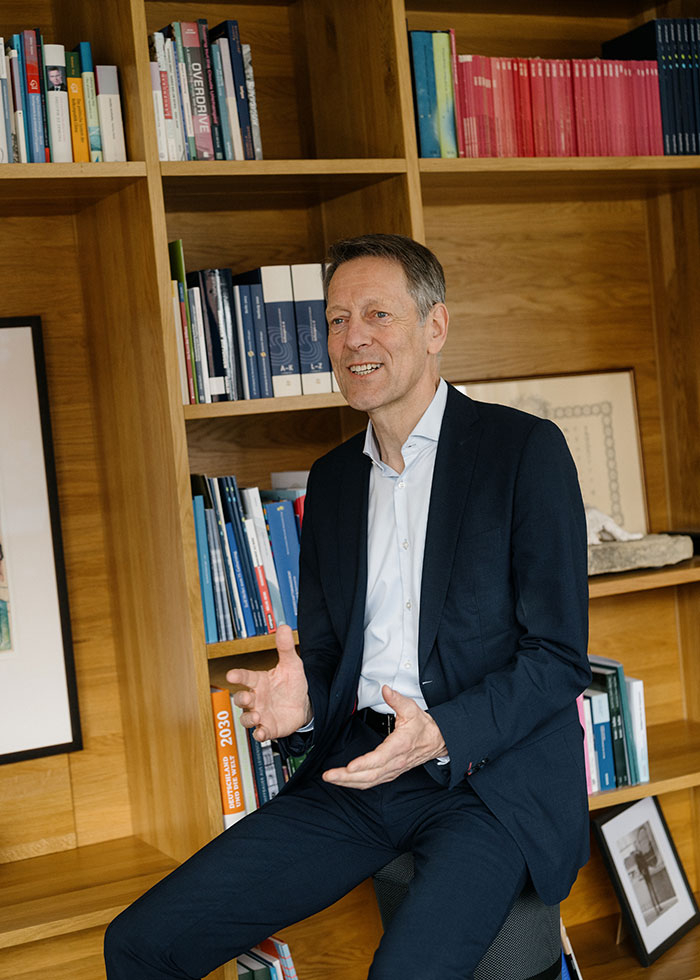
Dr Georg Schütte is CEO of the Volkswagen Foundation.
Mau: In my view, the overly simple answer would be that the older East Germans experienced their socialisation in a dictatorship and never really came to terms with democracy. I don't deny that growing up under state socialism has an effect on current politics because authoritarian thought patterns still persist. But if we look at the most recent election results, it was the young, not the old, who voted particularly strongly for the AfD, while the CDU was the strongest party among older East Germans in the federal elections. So, the matter is more complicated. In addition to the GDR experience, there is the social transformation damage incurred during the 1990s; but even that is not a sufficient explanation. For me, the continuing enormous socio-structural and demographic differences that still exist between East and West are also decisive.
How is this manifested?
Mau: The urban-rural divide is much greater. I would argue that large cities and university towns in eastern Germany are no longer much different from Hanover or Göttingen. However, it is the small and medium-sized towns and rural areas, i.e. the regions experiencing depopulation, where a different political culture prevails than in the regions with economic and thus population growth. This different culture is coupled with the pronounced weakness of the established democratic parties in eastern Germany, which I refer to as 'bonsai organisations' because they have so few members and are hardly in a position to help shape the political discourse. This weakness did not arise overnight either, but can be traced back to the collapse of the social fabric in the 1990s, to a barely existing civil society that did not exist in the GDR and that was never really able to take hold afterwards. This created a vacuum, and right-wing groups deliberately pushed their way into them with their networks, associations, and front organisations.
What did that lead to?
Mau: I was recently in Bautzen and met with people who are committed to an open society. The depressing thing is that they are treading such a lonely path. The broad social centre has withdrawn from the political arena for fear of the harshness and confrontational nature of the debate. What remains is a relatively small civil society, which is structured differently to the West, where membership of churches, trade unions and associations is more significant. So, the East remains different, but the AfD is also gaining influence in the West. You could say that the gap between the different parts of the country remains, but the level is shifting further and further to the right across the whole of Germany.
So instead of being mutually indignant between East and West and thus alienating each other, we should work on our ability to engage in dialogue and look for realistic solutions together.
Schütte: Meanwhile, in the West we are experiencing what I would call a disillusionment discourse. There were wide-spread demonstrations against the right-wing ascendency, which were supposed to be a public signal in defence of democracy. And then, low and behold, the AfD still managed to achieve record results in the West: in Gelsenkirchen, for example, it was at around 25 per cent, twice as high as in 2021, possibly because there are also regions in the West where people feel left behind. So instead of being mutually indignant between East and West and thus alienating each other, we should work on our ability to engage in dialogue and look for realistic solutions together. However, we must do so without falling into anti-democratic or right-wing populist positions, where civil liberties are restricted and human rights no longer come into play. I believe that our greatest political challenge is to enter into such a dialogue, which accomplishes the one without throwing the other overboard.
Mr Mau, do too many people in the East have a democratic deficit?
Mau: The term 'democracy' is probably not the right one in this context. The vast majority of people in Germany, even more in the East than in the West, say that democracy is a form of government worth supporting. But the ideas of what is meant by this differ. In the West, the understanding is linked to the procedures of representative democracy and a parliamentary system. In the East, on the other hand, many people think of a direct, unconditional, even homogeneously conceived will of the people that should be articulated. This can be criticised, but it is a given that has to be dealt with somehow.
In what way?
Mau: Studies show that if people can participate directly in a decision-making process, if they sit down together, if they work on a concrete political problem, then the feelings of hatred and resentment are contained and reduced. So, we need to give people the opportunity to have their say and practise democratic self-efficacy in their everyday lives. And we need to look more closely at young people, whose political socialisation no longer takes place in political parties, youth associations, the Young Community, or other organised forms. Instead, it takes place on social media such as YouTube, Instagram, or TikTok, where right-wing influencers have a wide reach. This is no different in the West, by the way.
While sociologists such as Steffen Mau issue warnings and make proposals for reform, the traditional parties are unsettled and are zigzagging in their programmes and communications. Does it also seem to you as if we are witnessing an accident in slow motion, Mr Schütte? Democracy is heading for disaster, and we are just standing by and watching?
Schütte: As a citizen, I have the ever-stronger feeling that we absolutely have to act, and quickly. As a representative of the Volkswagen Foundation, I say: We are doing what we can and what we are mandated to do. We can make a contribution towards reflecting on the phenomena of our democratic crisis and pointing out options for action. We can use the appropriate formats to bring science into dialogue with society. But we should not overreact. We would be hopelessly overstretched as a foundation. We could only fail if we attempted to act as a social repair organisation.
Mau: You are absolutely right. As a foundation, you cannot be both a science sponsor and a political actor at one and the same time. In the same way that as a scientist you are also a citizen, but you should not over politicise your role as a scientist. It is always a balancing act, especially for a sociologist who does not do research on microbes or biochemistry, but on things that affect society itself. As a scientist, I must constantly clarify the roles. Science that is overly politicised would delegitimise itself. It would be even more suspected by those who already take a critical view of science as only pursuing a political agenda. Once scientific authority is undermined, it loses its influence.
Is not the fear of scientists of being accused of activism outdated when the very act of citing scientific methods and findings is denounced as left-wing activism?
Mau: That must indeed be rejected. The question of scientific rigour is not for politicians or the lay public to decide. But the more agenda-setting you do as a scientist, the more reactance you generate. That is why I would be rather cautious in this regard.
There is still a remarkable strength of civil society and democratic resilience in Germany...
Despite the political situation, especially in eastern Germany, you are surprisingly relaxed, Mr Mau. Or is the impression deceptive?
Mau: As a scientist, I am constantly exposed to threats. I receive hate mail, I am accosted on the street, even though I think I express myself in public in a relatively moderate and scientifically sound manner. I find the idea that at some point universities in a federal state will have to operate under a science minister with anti-liberal views extremely worrying. We are currently seeing in the USA how quickly academic freedom can be fundamentally called into question and with it the integrity of science as a whole. However, we must not allow ourselves to be cowed or paralysed by fear. There is still a remarkable strength of civil society and democratic resilience in Germany that we have not yet fully mobilised.
Are you actually more optimistic for Germany than for the USA?
Mau: We saw the demonstrations organised at short notice last year with several hundred thousand people, and many more would turn out if the basic principles of our liberal democratic order were fundamentally attacked. My confidence that there would be stronger resistance in our country is also fuelled by German history with its two dictatorship experiences. While the USA is a country that, despite its long history of democracy, has never had to experience a democracy turning into a dictatorship.
Mr Schütte, do you share Steffen Mau's optimism that German civil society would react more resiliently to a threat to its freedom than American civil society?
Schütte: I agree with Mr Mau's assessment. A good 50 per cent of an age group in Germany now attend university. In the US, we have a much more pronounced social divide. One third of society there enjoys an extremely high standard of living, comparable to that of Switzerland, including excellent health and pension provision and access to outstanding universities. Another third live at a standard that is common in continental Europe and, depending on their talents and inclinations, attend universities comparable to those in Europe. The last third, on the other hand, is left behind in almost every respect. This enables an anti-elite discourse that, in my opinion, is unthinkable in Germany thanks to decades of educational expansion.
Mau: I was amazed at how little public outcry there was in the US when scientists and universities were attacked head-on by the government. Many preferred to run for cover to avoid coming under fire from the Trump administration. You can never rule out similar effects in Germany. Obviously, there is a fundamental opportunism in human nature that comes into play very early on, even before the threats become real for the majority.
We need a political programme that includes a vision but also has real potential to be implemented.
What do you want from the new federal government, Mr Mau?
Mau: I have a whole bouquet of wishes. The most important thing is that it resists the inflation of particularistic demands fuelled by the new sources of additional monies and instead is seen to develop a genuine programme for a modernisation push. Instead of just catering to certain particularist desires, politics should focus on solving the problems that concern people the most, in a competent and relevant way. Take the issue of migration. In surveys, it is sometimes ranked only 10th among the most important problems. As a member of the Expert Council on Migration and Integration, I have contributed to various reports, which unfortunately have received little attention from politicians. They show an overall picture that is not as bleak and dark as some people think, neither in terms of labour market integration nor crime. Conversely, there are the success stories of the migration society. While some leading politicians claim that refugees come to Germany to have their teeth done here, the reality is that 30 per cent of our physicians have a migrant background. And without them, it would be far more difficult to get a doctor's appointment.
Schütte: That applies to the exaggeration of an alleged migration crisis, and it also applies to the exaggerated furore surrounding topics such as gendering and debates about a third gender. In the US, this was a welcome gateway for right-wing populists, who accused the Democrats of alienating themselves from so-called normal people.
Mau: I am not in favour of the theory that the rise of the right is just a reaction to the wokeness of the left-liberal milieu. But politics must solve visible, tangible problems: the housing shortage, inflation, pension provision. More fundamentally, it must restore the public administration's ability to act in the digital world and ensure the functioning of local public transport. The former President of the Federal Constitutional Court, Andreas Voßkuhle, once said that Deutsche Bahn's tardiness is also a democratic problem. That is the way it is: When people feel that public institutions are failing to fulfil their core tasks, they turn away.
Schütte: We need a political programme that includes a vision but also has real potential to be implemented. The challenge will be to think big and develop the necessary individual instruments without getting caught up in the details.

